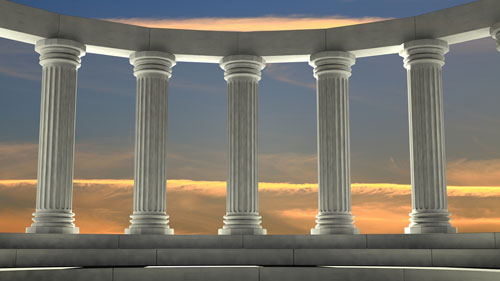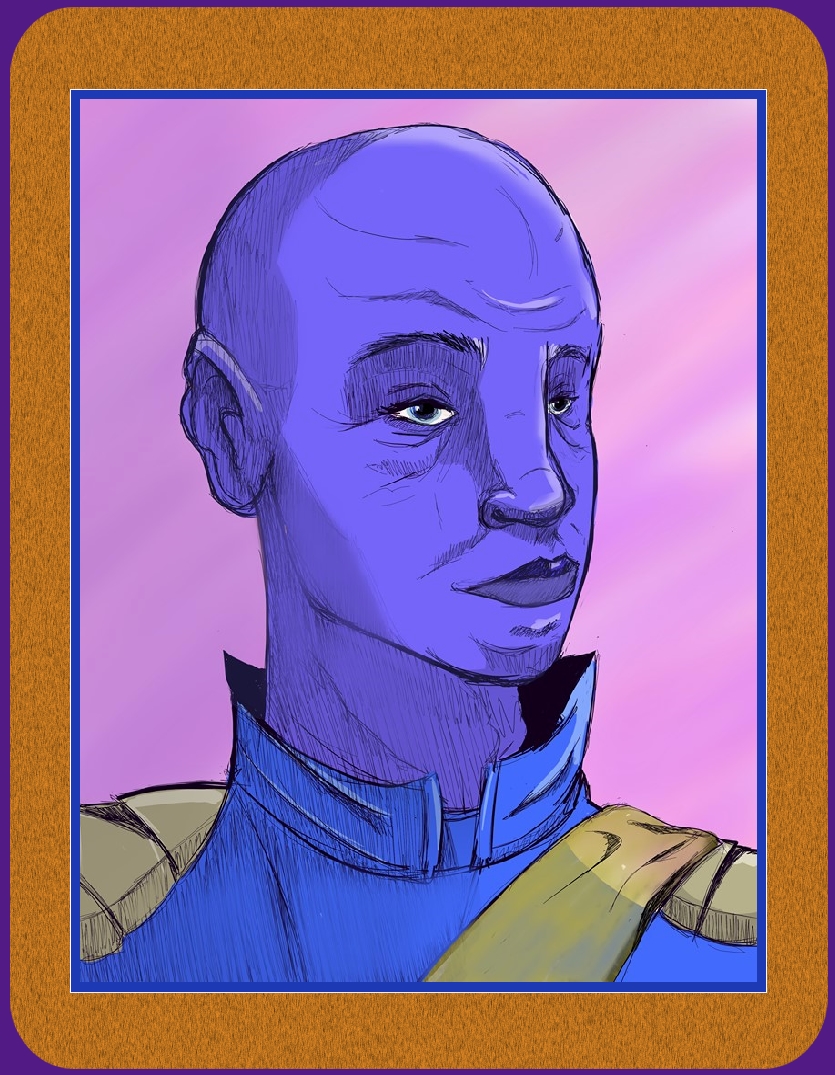
(Omal explains the details of being seventh dimensional and how they differ in what someone of a lower dimension would experience. He takes a stage play as an example and what details are taken in to make a fuller picture of the production than normally noticed by those on the third dimension.)
Omal: greetings Russ.
Russ: greetings Omal.
Omal: it has been some time has it not?
Russ: it has indeed.
Omal: approximately a month.
Russ: uh-huh, it's nice to see you again.
Omal: thank you and it is good to see you too. I believe you have a question for me to answer your question. It is different in the feel, the more in tune with the surroundings, the more vibrations from the surroundings, the more feeling of familiarity. The fact that in the seventh dimension, the trees are more aware, the rocks are more aware. Everything is more connected in the awareness of each other.
Russ: hmm. So all things manifest?
Omal: yes. Being a manifestor myself, I am more in tune than other seventh dimensional beings with my surroundings, in my awareness, in the feelings of familiarity, the feelings of being connected.
Russ: so when you manifest something, is that something aware?
Omal: for me yes.
Russ: so isn't that sort of like being God?
Omal: no.
Russ: okay.
Omal: what is God?
Russ: well I mean the version of God that would be called a creator.
Omal: so, when you create a webpage, are you being a God?
Russ: well the point of it is though, with the awareness that you feel. Let me take it to another point, Ashtar-Athena.......
Omal: uh-huh.
Russ: in her channeling to us.......
Omal: uh-huh.
Russ: reflected heavily on the fact that we're all actors and actresses.
Omal: uh-huh.
Russ: and is that something you get into as the higher dimensions go up? You see more of the play?
Omal: she does love to use analogies does she not?
Russ: uh-huh.
Omal: yes, you are more aware of the play. Instead of seeing just the actors on the stage, the backdrop on the stage, the music coming from the orchestra pit, you are more in tune with the movements of the actors. The fact that on the mantelpiece maybe there is a clock, maybe there is something else as well. You see more of the picture, you see more of the actor's movements. The fact that the lead person that is talking, who is doing their poor actor that struts and frets their hour upon the stage, the person behind them may be leaning on one arm looking at them quizzically. The person to the left may be watching with their hands on their hips. The other person on the left part of the stage may be looking more into the audience and somebody else may still be walking towards the speaker that is strutting and fretting their hour upon the stage. Instead of being just aware of the speaker and the backdrop and the orchestra, you are more in tune with what I've just mentioned plus what they are wearing. The fabric that they are wearing, the texture, the color, the smells, the odors, the body movements, the body language, the meaning in their movements. You see no longer is it just a person on the stage speaking and acting, it is an experience.
Russ: hmm. Well Korton has often said that it's very important to listen to what is being said.
Omal: that is a higher dimensional outlook as well as something that is very useful and should be done on a third dimensional level.
Russ: right. Now let's take what you just said. This is more in the way of not only listening to the words of the play, but more paying attention to all the detail besides the words.
Omal: yes, the detail may have some meaning. For example, let us say that you have a person that is playing a scene that is all depressed and on the table is a dagger. It is there, it was there when the curtain came up but you see the dagger. You are aware of the dagger and the person who is playing a depressed scene, they grab the dagger and they stab themselves in the heart. You see?
Russ: uh-huh.
Omal: you are more aware of what is going on. You see more detail, you know the fact that they are planning something, the knife plays a part.
Russ: hmmm.
Omal: there is a lady in the kitchen, this is on a stage. In the kitchen, you see that the table is set. She is complaining the fact that her husband is late. Now what does this tell you? She is in the kitchen. On the kitchen table is a knife, a fork, spoon, a napkin, a candle, a wineglass or two wineglasses, two plates, two knives, two forks, two spoons, what does this tell you?
Russ: it tells you she is preparing for more people to eat the dinner.
Omal: it tells you something more than that. How often does a person have a candle on the table with wineglasses?
Russ: it tells you that maybe someone special is coming to dinner.
Omal: good, now she is complaining. What does that tell you?
Russ: that he's late?
Omal: good. Put it all together. She is cooking a special dinner or has cooked a special dinner. She is expecting somebody of importance and she has set up accordingly and that person is late.
Russ: I see.
Omal: so it is being more aware of the goings-on. Being more observant. For example, look around this room.
Russ: uh-huh.
Omal: what does it tell you?
Russ: it's a place of study and a place of work.
Omal: now what kind of people have been in this room?
Russ: people who come just to learn.
Omal: more, there's more than that that is told. We're talking about observation.
Russ: well if you look at the tapes.......
Omal: uh-huh.
Russ: you would see that there's mass amounts of information stored here and that the people coming here are here to gain the information that is given.
Omal: there is also some thinking going on in here.
Russ: uh-huh.
Omal: there is a picture that indicates that. There is also culture as in the pottery. There is a reminder or a keepsake from a young lady. There is a lot of energy, there is a lot of humor.
Russ: healing.
Omal: a lot of healing. So it is not just a place where people come to study. It is a place filled with memories, humor, knowledge, energy and I could go on listing.
Russ: right. I see what you mean.
Omal: it is a room that has had a lot of love, I'm not talking about the love for all things, I'm talking about the love between people.
Russ: uh-hmm.
Omal: it has had some physical love. These are all echoed in little pieces throughout the room.
Russ: so the first step is to listen, to gain that knowledge.......
Omal: correct.
Russ: and then to observe would be the next step in that.
Omal: correct.
Russ: and then what comes after that?
Omal: putting both together, listening and observing and finally interacting, being aware, being in tune, being able to know what to do. Doing the right thing, which is not as easy as it sounds.
Russ: what about sense of humor in the higher dimensions?
Omal: oh, we have a good sense of humor as you have heard.
Russ: as I've heard but not as often as I hear in sixth dimension.
Omal: no.
Russ: why? Is that because you see it.....you see it more of the actors and actresses.......
Omal: uh-huh.
Russ: then you should be laughing at the play sad or happy because you just see it as the play, you don't take it as serious as if it was real life.
Omal: (chuckles) okay Karra made a very good analogy a while back.
Russ: okay.
Omal: concerning seventh dimensional and higher individuals. For you, you work on the scale of 23 hours 59 minutes, I work on a much longer time scale.
Russ: uh-huh.
Omal: so I may laugh, I may make jokes and I think I make quite a few jokes.
Russ: quite a few for....
Omal: but in the timescale of you, you see it as occasionally. For me, I do not see it in that timescale of occasionally.
Russ: ahhh. I see, so you get more of a bigger picture.
Omal: correct.
Russ: hmm, so it's tough to laugh 24 hours a day at something that's going on for a millennium.
Omal: correct.
Russ: you'd hurt your face.
Omal: put it this way, I told a joke to Korton.
Russ: okay.
Omal: I told the joke, it would be close to a 100 years now. This may in itself be a little bit of a joke. Korton got back to me on the joke just a few days ago. So you see the timescales are very different.
Russ: yeah.
Omal: when I talk of watching the aurora borealis a 100, sorry....80,000 years ago, that is not that long ago.
Russ: hmm, time just becomes meaningless?
Omal: put it this way, if each of your 38 years, is that correct?
Russ: uh-huh.
Omal: was a 100 years, one of your 38 years........just one of those 38 years was a 100 years, how many would that be?
Russ: 3,800 years.
Omal: three thousand, eight hundred years.
Russ: right.
Omal: okay, how long ago was that?
Russ: it was about the point where the Egyptians were just starting their civilization up?
Omal: actually they were at the peak of their civilization.
Russ: oh okay.
Omal: it is about the time of Ramses the first or second.
Russ: okay, so therefore the Sumerians were in pretty good shape also as were the Babylonians.
Omal: uh-huh.
Russ: the rest the world was pretty much in a very dark age.
Omal: no, but continue.
Russ: right, basically if you were to look at the world at that point then, yeah it would be.....a lot of your light would be focused right there on Egypt.
Omal: now this ties in with what I was saying on the other side of your recording about looking at the big picture. You have just told me something that you did not say. It was a long time ago you told me, was it?
Russ: oh yeah.
Omal: was it? For you.......
Russ: from my point of view yeah.
Omal: but for me, it would be like saying last year, it's not that long ago.
